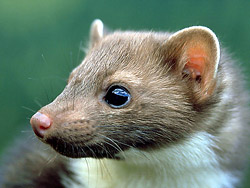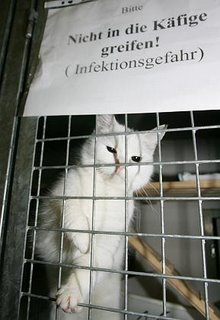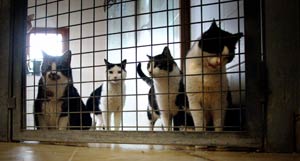Two More Cats and a Steinmarder Die of Vogelgrippe on Insel Rügen Prompting Panicky Owners to Abandon Their Felines at Shelters

Two more cats and a Steinmarder (See photo on the right) have died from Vogelgrippe on Deutschland's Insel Rügen. According to the March 7th edition of Stern, both cats were found in the Wittower Fahre section of Rügen but it is not known whether they were domesticated or feral felines. One of them was found dead in an empty outbuilding on a farm while the other one was discovered by a policewoman in a garden plot. (See "Zwei weitere Katzen mit H5N1 infiziert.")
The Steinmarder, a type of weasel, was found alive but exhibiting Grippesymptomen on March 2nd in the Schaprode section of Rügen. He was quickly done away with by the Ruegener Amtstierarzt. (See Aachener Zeitung, March 9, 2006, "Weltweit erstmals Vogelgrippe bei Steinmarder.") Tests conducted on one-hundred-seventy of more than three-thousand Wildvogeln, primarily swans, found dead on Rügen have confirmed that they also were felled by Vogelgrippe.
While it is generally assumed that the three Katzen and the Steinmarder contracted the deadly H5N1 virus from eating contaminated birds, Josef H. Reichholf, a zoologist at Technischen Universitat Munchen, thinks that the experts have got it all wrong. He is quoted in the March 9th edition of Expatica as blaming chicken manure for the spread of the disease. (See "Poultry Faeces (sic) Causing Bird Flu Spread: Expert.") He theorizes that runoff from poultry farms is being washed into lakes, rivers, and the oceans where it is then being ingested by fish and other marine mammals. The contaminated fish are then eaten by birds and terrestrial animals.
In support of his argument, he points out that fish meal is widely fed to poultry and other animals and that the trio of civet cats who died from Vogelgrippe in Vietnam last August had been fed fish. Reichholf likewise believes that Katzen are contracting the virus through coming into contact with chicken manure used by farmers as a fertilizer as opposed to being sickened from eating contaminated birds. He also notes that the spread of the virus from east to west is at odds at the normal north to south migration route of most birds and, more importantly, that the virus is spreading at the wrong time of the year.
Many of Reichholf's objections to standard orthodoxy concerning Vogelgrippe have been debunked in the past by ornithologists and virologists who have studied the spread of the West Nile Virus. According to some experts, that deadly virus was carried to New York from Israel on the wings of Wildvogeln who in turn infected other birds who spread the disease all the way to Los Angeles. (See Kurt D. Reed, Jennifer K. Meece, James S. Henkel, and Sanjay K. Shukula, "Birds, Migration and Emerging Zoonoses: West Nile Virus, Lyme Disease, Influenza A and Enterpathogens," at www.pubmedcentral.nih.gov.)
Regardless of how it is being spread, Reichholf nonetheless believes that Vogelgrippe has been around for years but went undetected because the large number of birds who die off each winter were never tested for it. Tant pis, he believes that the virus is going to be around for some time.
Reichholf's theory was quickly dismissed by Thomas Mettenleiter, president of the Friedrich Loeffler Institut fur Tiergesundheit, who labeled the chances of getting Vogelgrippe from fish as "sehr gering." On March 8th, he told the Aachener Zeitung, "Die unterschiedlichen Korpertemperaturen von Nutz- und Wildflugel einerseits und Fischen andererseits wurden derzeit ein Uberspringen des Erregers behindern." (See "Vogelgrippe weitet sich aus.") He also said that an increase in the Erregers in fish was very unlikely without further mutations of the virus and that is was perfectly safe for people to consume fish and fish products.
On March 15th, the BBC reported that a stray dog had died from Vogelgrippe in Baku, the capital of Azerbaijan. (See "Bird Flu 'Causes First Dog Death.'") This report has not been confirmed by Western health experts and it contradicts the widely held notion that canines are immune to the virus. Should this report be proven true, it would signal that the virus is attacking larger mammals and drawing ever closer to man.

Throughout history there have always been unscrupulous individuals and groups who have profited mightily from the miseries of both animals and their fellow citizens. For example, both the oil companies and international shipping concerns, egged on by The New York Times and its sister publication the International Herald Tribune, are already making plans to clean up as soon as what remains of the polar icecap melts in the Arctic. Malheursement, the situation is not any different with Vogelgrippe as capitalists and politicians all around the world are already licking their chops in greedy anticipation of all the money that they are going to make off of a pandemic.
On March 13, Der Spiegel reported that Citicorp analysts Bruce Rolph and Robert Bonte-Friedheim have prepared a report listing the industries most likely to profit from a pandemic as well as those most likely to be harmed by one. As it would be expected, pharmaceutical concerns (Gilead, Roche, GlaxoSmithKline, Sanofi-Aventis, etc.), manufacturers of disinfectants (Henkel, Reckitt-Benckiser, Ecolab, Clorox, Proctor and Gamble, etc.), public health concerns (Tenet, community hospitals, etc.), home entertainment providers (Nintendo, Blockbuster, etc.), telecommunications companies (Deutsche Telekom, AT&T, BT, etc.), and internet giants (eBay, Google, Yahoo, etc.), should all make out like bandits. Industries likely to be hit hard by a pandemic are the airlines, hotels, insurance companies, high-end retailers, oil companies, coal mining outfits, and, mein Gott, beer producers. (See "Wer von der Vogelgrippe profitiert.")
On the same day, the International Monetary Fund (IMF) warned that a pandemic could do considerable damage to both domestic economies and global trade as well. On the domestic front, the world organization is predicting big increases in both worker absenteeism and inflation coupled with a growing demand for cash. It also expects commodity prices to drop and that for increased spending on Voglegrippe to put added fiscal pressure on governments. On the international level, the IMF is predicting major disruptions in trade, transportation, and the supply of oil as well as a reduction in the flow of capital to emerging markets. (See Reuters, "IMF Warns of Economic Pain from Bird Flu Pandemic.")
While capitalists and politicians alike plan and scheme on how they are going to profit from Vogelgrippe, cats as usual are being forced to pay the highest price. Not only are they dying of the virus, but their owners have been ordered by health officials to keep them indoors in contaminated areas. In other instances, such as at Arche Noah in Graz, Austria (See photo above on the left), they are being held in quarantine.

Worst still, during the past couple of weeks hundreds, if not thousands, of cats have been dumped at shelters in Deutschland and Frankreich (See photo on the right of cats at a shelter in France). "A lot of owners pretend they have suddenly developed an allergy to cat fur," a worker at the French Society for the Protection of Animals told the Times of London on March 9th. (See "Flu Panic Hits Cats, Dogs -- and Disney.")
By abandoning their cats, owners are signing their death warrants because shelters, already overcrowded, will exterminate just about all of them. Although there is not any evidence that cats can transmit the virus to humans, it is highly unlikely that many people will be willing to open up their homes to new cats as long as Vogelgrippe is still around. Since shelter workers are not only mass murderers but inveterate liars as well, cat-lovers likely will never know just how many cats they are exterminating because of Vogelgrippe. Moreover, if the reports from Azerbaijan are confirmed, dogs could be the next animal to be slaughtered en masse.
As it has happened so often in the past, cats are once again being made the scapegoats for man's insatiable greed and corruption of nature. Rather than exterminating cats, man ought to learn to live in harmony with the animals and Mother Earth; in particular, factory farming should be outlawed. Of course, that is not about to happen because there is simply too much money in it for the capitalists and very few consumers care what they are eating or where it comes from; consequently, the abuse and slaughter of defenseless animals and the corresponding spread of both old and new zoonotic diseases is going to continue unabated. Man likes to consider himself to be educated but over and over again his actions prove that his tuition has not progressed very far.
Photos: Deutsche Presseagentur (Steinmarder), Associated Press (Graz cat), and Jean-Philippe Ksiazek, Agence France Presse (French shelter).

<< Home